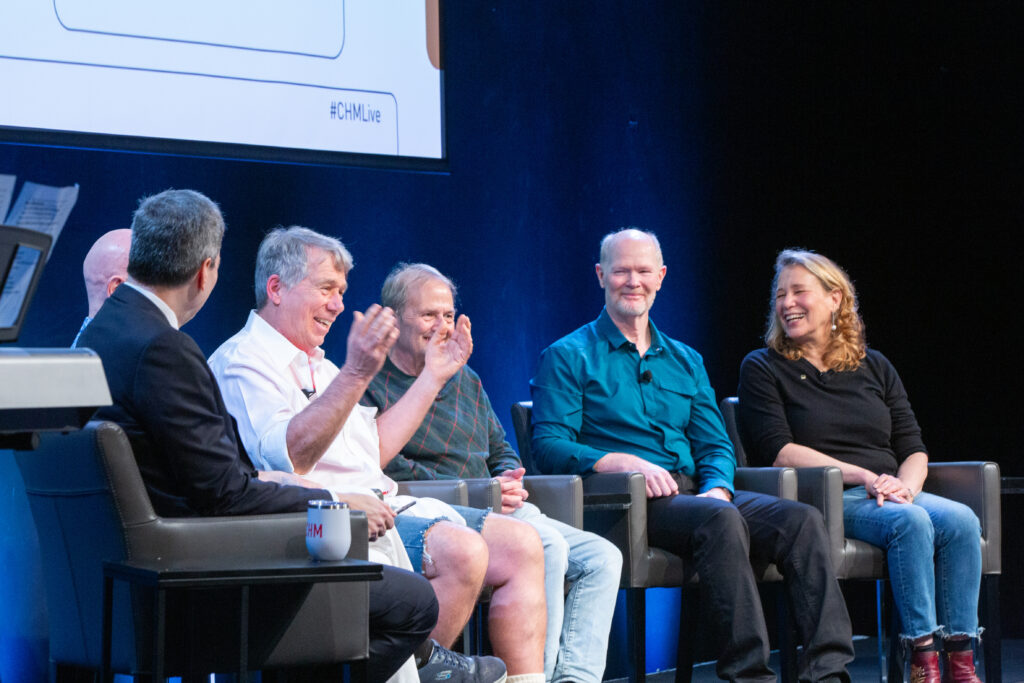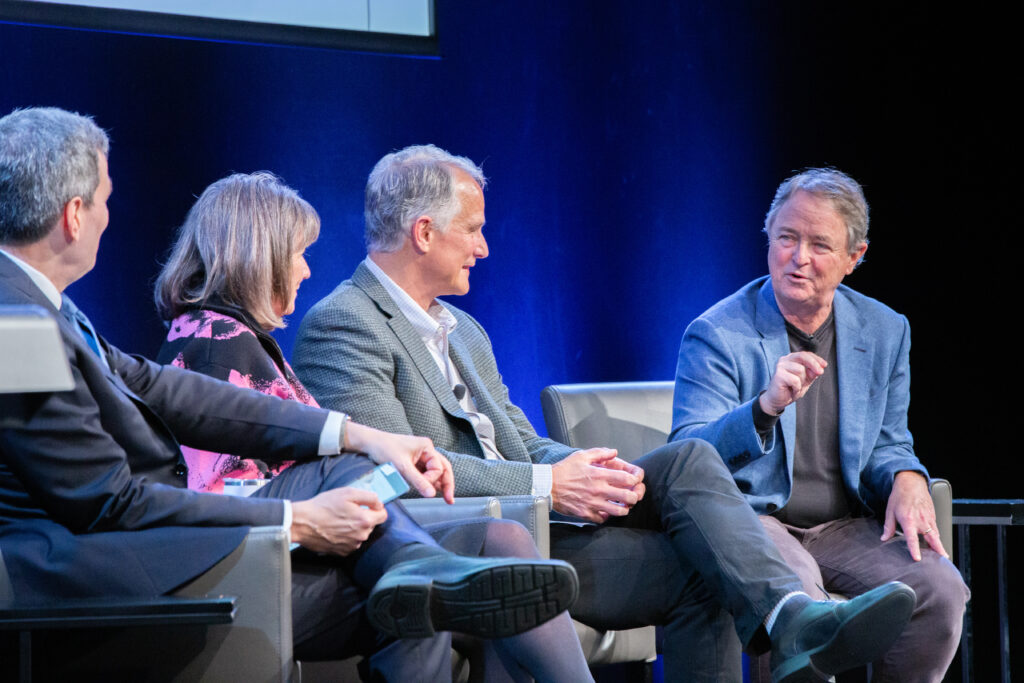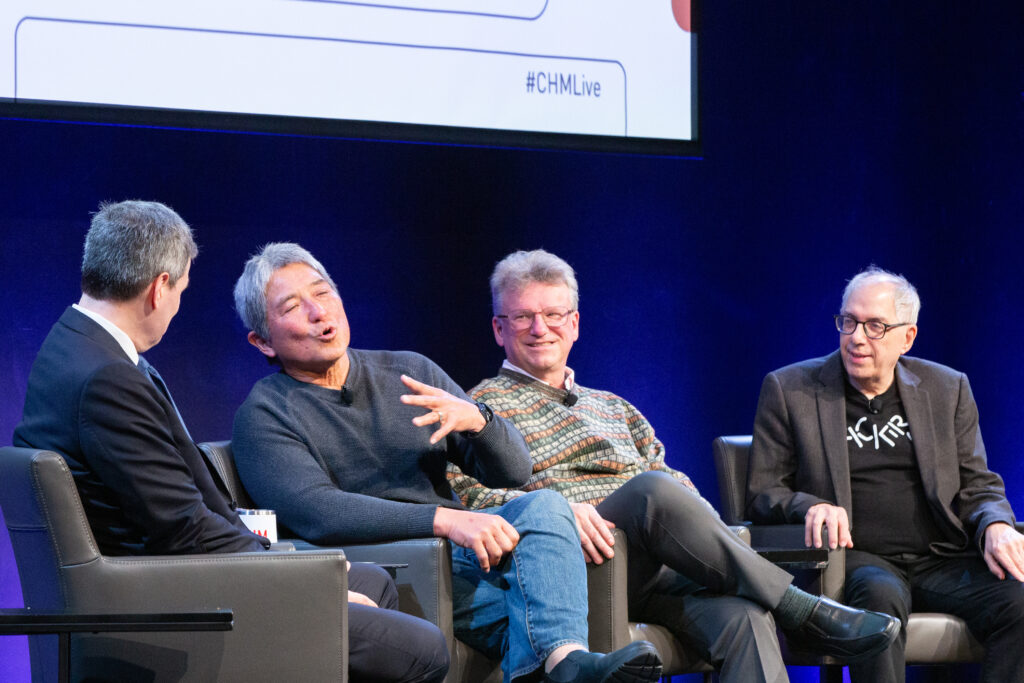“Are you a Mac person?” CHM President and CEO (and former Mac marketer) Dan’l Lewin asked an enthusiastic CHM Live crowd on the 40th anniversary of the Macintosh’s launch—January 24, 2024. Many hands waved in the sold-out audience, which included Apple cofounder Steve Wozniak.
Moderated by tech journalist and author David Pogue, the evening included three panels of original Mac team members and Apple insiders—rock stars of the computing industry. Here are some highlights.

From left to right: David Pogue, Bill Atkinson, Steve Capps (speaking), Andy Hertzfeld, Bruce Horn, Susan Kare
The first panel featured Mac Development Team members Bill Atkinson, Steve Capps, Andy Hertzfeld, and Bruce Horn, and creator of the Mac icons and fonts Susan Kare. They shared stories of trials and errors, long days, and work nights fueled by chocolate covered espresso beans.
To test the new machine, the team filmed Apple employee spouses and asked them to mutter what they were thinking as they explored with the mouse. Lots of people became confused by the choice to “Do It” or “Cancel,” and the team realized they thought the button said “Dolt.” They immediately changed it to read “Ok” instead.
Bill remembered how Steve Jobs inspired him to join the team, asking if he'd rather be surfing the front of the wave or dog paddling behind it. The team talked about how Steve encouraged them to believe they were making art.
Mac team members remember Steve Jobs.
The team went on to discuss the original vision of the Mac as an inexpensive, easy-to-use machine for the masses, where rounded corner rectangles came from, why shortcuts look the way they do, and how double-clicking was a mistake. They were unanimous in feeling that being a part of the Mac team was the highlight of their careers.

From left: David Pogue, Andy Cunningham, Dan'l Lewin, Mike Murray (speaking)
The second panel featured Andy Cunningham, Dan’l Lewin, and Mike Murray, marketing team members responsible for getting the Mac into the hands of new users. The session opened with a video of the iconic 1984 Super Bowl ad directed by Ridley Scott.
The inside story of the famous ad, according to Mike, was that the board hated it and didn’t want it to run. But, when the advertising firm couldn’t (or wouldn’t?) sell the spot to another advertiser it ran anyway. A week later, the entire board gave the executive team a standing ovation.
Despite the ad, selling the Mac wasn’t easy, and the team knew they were in trouble even before the launch.
Mike Murray describes an early Mac focus group.
Looking for a market outside of business sent Dan’l on to university campuses, where contending with outdated distribution channels and consumer protection regulations that prohibited direct shipping forced him to find unique ways to bring the computers to students. He came up with a novel strategy to offer Macs through university purchasing departments.
Still, the Mac wasn’t selling fast enough. Andy remembered their “diagonal marketing” strategy, which basically meant trying to find customers anywhere. The marketing team conducted factory visits and demos for businesspeople. They visited developers to encourage them to write software for the Mac. They considered dedicated Apple Stores. They even offered a “test drive a Mac” campaign where people could pick one up for a weekend. Feeling the pressure not to let everyone’s hard work go to waste, the team was determined not to let the Mac fail. And they didn’t.

From left: David Pogue, Guy Kawasaki, Chris Espinosa, Steven Levy
The final panel focused on the Mac’s impact and featured the longest-serving Apple employee Chris Espinosa (47 years!), former Apple Chief Evangelist Guy Kawasaki, and tech journalist Steven Levy, along with David Pogue.
Chris noted that without the Mac, Apple would not have survived as a company and there would have been no iPhone. Embedded with the team for a few days to write a piece for Rolling Stone, Steven used a Mac for the first time. He said he knew immediately that a revolution had happened.
The Mac gave people the technology to unleash their creativity. But first they had to know it existed and what it could do for them.
Guy Kawasaki describes selling the Mac to developers.
Chris has been at Apple since he started working with Steve Jobs and Steve Wozniak when they were building the first Apple computer in the Jobs’ family garage. He says that the original Apple marketing principles developed in 1978 by investor and mentor Mike Markkula endure and are still taught at the company today.
And, despite becoming the most highly capitalized business in the world, the company has retained a “demo ethos,” which means, in Chris' words, "get a great product first." That may just be the secret behind Apple's success.
The event ended with a special treat that speaks—or rather, sings—for itself.
David Pogue performs a parody song he wrote about premature predictions of Apple’s demise.
Insanely Great | CHM Live, January 24, 2024
Free events like these would not be possible without the generous support of people like you who care deeply about decoding technology for everyone. Please consider making a donation.